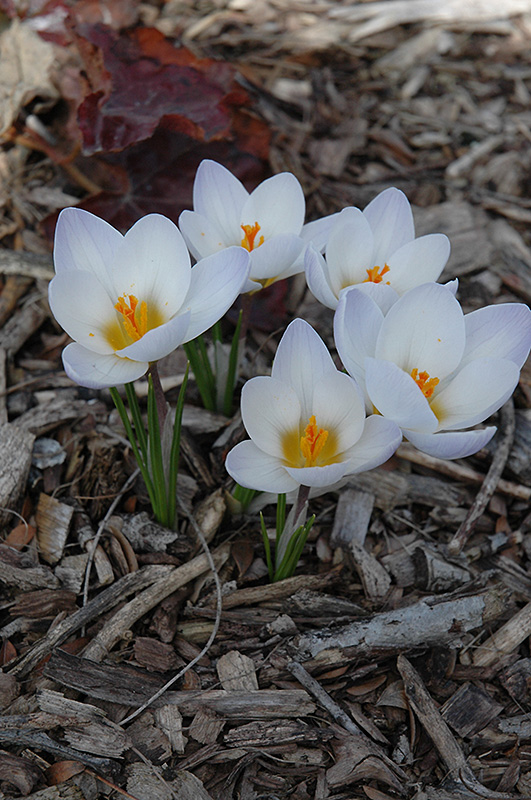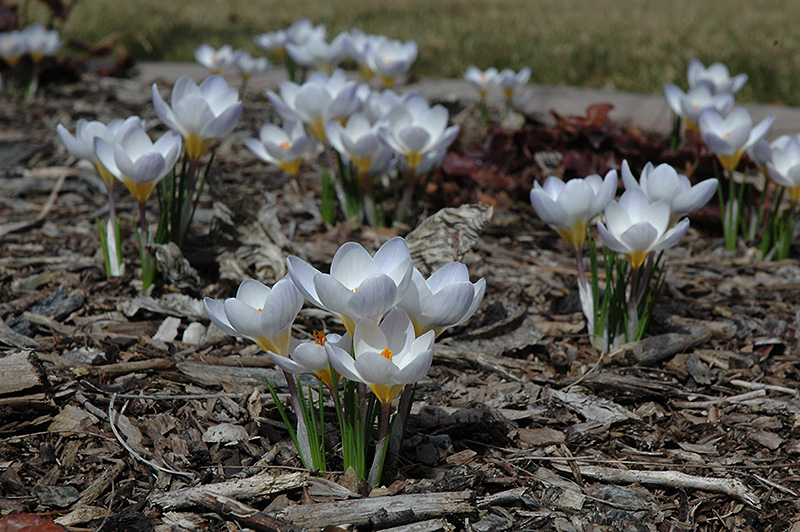Search Our Plants
Height: 3 inches
Spacing: 3 inches
Sunlight:
![]()
Hardiness Zone: 3
Description:
Easy to grow and blooming in early spring, perfect for flower beds, lawns or rock gardens; cool blue outer petals with creamy white insides and golden yellow eyes are features on grass-like foliage; adaptable as a houseplant
Ornamental Features
Blue Pearl Crocus has masses of beautiful white cup-shaped flowers with sky blue overtones and yellow eyes at the ends of the stems in early spring, which are most effective when planted in groupings. Its attractive grassy leaves remain forest green in color with prominent white stripes throughout the season.
Landscape Attributes
Blue Pearl Crocus is an open herbaceous perennial with an upright spreading habit of growth. It brings an extremely fine and delicate texture to the garden composition and should be used to full effect.
This is a relatively low maintenance plant, and should never be pruned except to remove any dieback, as it tends not to take pruning well. It has no significant negative characteristics.
Blue Pearl Crocus is recommended for the following landscape applications;
- Mass Planting
- Rock/Alpine Gardens
- General Garden Use
- Naturalizing And Woodland Gardens
- Container Planting
Planting & Growing
Blue Pearl Crocus will grow to be only 3 inches tall at maturity, with a spread of 4 inches. When grown in masses or used as a bedding plant, individual plants should be spaced approximately 3 inches apart. Its foliage tends to remain low and dense right to the ground. It grows at a slow rate, and under ideal conditions can be expected to live for approximately 5 years. As an herbaceous perennial, this plant will usually die back to the crown each winter, and will regrow from the base each spring. Be careful not to disturb the crown in late winter when it may not be readily seen! As this plant tends to go dormant in summer, it is best interplanted with late-season bloomers to hide the dying foliage.
This plant should only be grown in full sunlight. It does best in average to evenly moist conditions, but will not tolerate standing water. It is not particular as to soil type or pH. It is somewhat tolerant of urban pollution. Consider covering it with a thick layer of mulch in winter to protect it in exposed locations or colder microclimates. This particular variety is an interspecific hybrid. It can be propagated by multiplication of the underground bulbs; however, as a cultivated variety, be aware that it may be subject to certain restrictions or prohibitions on propagation.
Blue Pearl Crocus is a fine choice for the garden, but it is also a good selection for planting in outdoor pots and containers. It is often used as a 'filler' in the 'spiller-thriller-filler' container combination, providing a mass of flowers and foliage against which the larger thriller plants stand out. Note that when growing plants in outdoor containers and baskets, they may require more frequent waterings than they would in the yard or garden.
This Plant Finder tool is an online catalog representing many of the varieties that we carry over the course of the season, and is intended for informational purposes only. Inventory varies seasonally, so we cannot guarantee that every plant will be in stock at all times - please contact your nearest Platt Hill Nursery store for current availability. It does not include our entire inventory of plants, so be sure to visit us to see varieties that may not be represented on this list.


